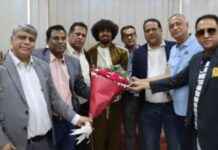Efficient National ID Creation by Unity Commission
In a bid to streamline the formation of a unified national identity, the National Unity Commission is actively engaging with various political parties and alliances based on recommendations from six reform commissions. The goal is to swiftly reach a consensus and establish a “National Document” within a short timeframe.
On Monday, March 10, the National Unity Commission held a press conference at the Jatiya Sangsad Bhaban to discuss and consider the recommendations of the six reform commissions constituted by the government. Ali Riaz, the Vice-Chair of the National Unity Commission, highlighted the importance of organizing the crucial recommendations from the remaining five commissions in a structured manner to present them for feedback from political parties and alliances.
During the press conference, Ali Riaz emphasized the need for swift action, especially in light of the unprecedented student-led uprising in July-August 2024, which marked the end of a repressive regime after sixteen years and led to Sheikh Hasina stepping down. Under the leadership of Professor Muhammad Yunus, the interim government established eleven reform commissions focusing on constitution, electoral system, judiciary, administration, anti-corruption, and police reform.
Ali Riaz further explained that the formation of the National Unity Commission comprising seven members was initiated on February 12 with Professor Muhammad Yunus serving as its chairman. As the Deputy Chair of the Commission, my responsibility is to oversee the operations, with other members including Dr. Badrul Alam Majumdar, Abdul Muhyid Choudhury, Safraraj Hossain, Justice Emdadul Haq, and Dr. Iftekharuzzaman, operating under a six-month term. In a move to facilitate collaboration, veteran journalist Monir Haydar was appointed as a special assistant to the Chief Advisor of the interim government.
The commission has started its work since February 15, and the launch event witnessed a harmonious gathering of representatives from all thirty-four political parties. The 104 representatives in attendance expressed their resolve to propel the reformation process forward. The political parties received hard copies of the comprehensive reports from all six commissions by February 22, after previously receiving soft copies of the reports.
Subsequently, the commission members convened three meetings to analyze and highlight crucial recommendations from the respective commission reports. The recommendations were then organized into distinct formats for further deliberation and consensus-building. Notably, the recommendations from the Police Reform Commission were not included, given their view that administrative implementation was feasible through existing mechanisms.
Ali Riaz informed that a total of 166 recommendations had been presented to the political parties and alliances by March 6. These recommendations covered various aspects, with 70 related to constitutional reform, 27 to electoral system updates, 23 to judiciary reformation, 26 to administrative improvements, and 20 to anti-corruption measures. Each recommendation sought a unanimous or partial agreement from political entities.
The recommendations were presented in pairs, giving three choices – agreement, disagreement, or partial agreement – for each matter, indicated by a tick mark. Moreover, each recommendation was accompanied by a space for parties to provide their comments.
Looking ahead, Ali Riaz expressed hope that the political parties and alliances would share their feedback by March 13. Following this, direct discussions with party representatives would commence to facilitate swift consensus-building. However, no specific timeline has been set yet as the commission aims to accommodate the varying positions and influences of different political parties.
Emphasizing the importance of dialogue and discussion, Ali Riaz noted that while numerical agreement is essential, achieving consensus on most proposals would be ideal for the process to proceed smoothly. He highlighted the need to consider each political party’s standing and influence while making decisions. The commission will carefully evaluate these factors to navigate the next steps effectively.
In addressing concerns about potential delays hindering the national identity creation process, Ali Riaz clarified that there is no conflict between the election and reform processes. He expressed optimism that more concrete steps would be taken soon to address the election issue. The interim government has been repeatedly urged to expedite the process, and further clarity on this matter is expected in the near future.
As of now, Dr. Badrul Alam Majumdar, Abdul Muhyid Choudhury, Safraraj Hossain, Justice Emdadul Haq, and Dr. Iftekharuzzaman are active members of the commission, working towards the collective goal of establishing a unified national identity.
As the clock ticks towards a culmination, it remains crucial to ensure the seamless integration of diverse viewpoints and swift decision-making to pave the way for a “National Document.” Stay tuned for updates on the commission’s progress and upcoming steps in this transformative journey.
Bangladesh Time: 1413 hours, March 10, 2025




















